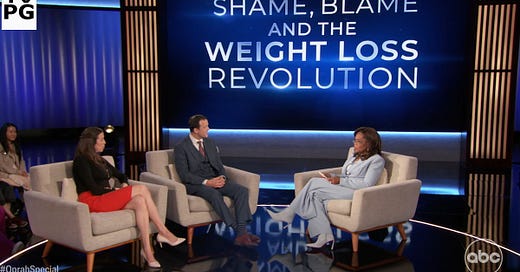Oprah’s Hour-Long Infomercial For Big Pharma
Makers of popular weight-loss drugs, Novo Nordisk and Eli Lilly, both had executives featured on Oprah Winfrey’s obesity special. Both have also spent heavily to advertise on ABC.
Oprah Winfrey held an hour-long special on “Shame, Blame and the Weight Loss Revolution” with ABC Monday night. What aired was a corporate-sponsored infomercial for Big Pharma’s lucrative injections to capitalize on the latest weight-loss craze.
Winfrey opened the program with a dedication to “the more than one hundred million people in the United States and the over one billion people around the world who are living with obesity.”
“I come to this conversation in the hope that we can start releasing the stigma and the shame and the judgment, to stop shaming other people for being overweight or how they choose to lose or not lose weight,” she said.
Big Food and Big Pharma naturally have the most to gain from a nation eager to shed the stigma around excess weight. Food corporations count on a population of addicts to continue blind consumption while the pharmaceutical industry designs expensive medical interventions to enable the behavior making us sick in the first place.
Here’s more coverage of Monday night’s program in The Federalist:
Winfrey’s first guest was a suburban mother named Amy Kane on the outskirts of Chicago who lost 160 pounds on one such drug — Mounjaro — following a debilitating food addiction developed to cope with the stress of Covid lockdowns.
“I just turned to food, I didn’t care, I was at my highest weight, it was about 300 pounds, and then the inevitable happened: I was diagnosed with diabetes,” said Kane. “My labs and blood work were scary.”
After Kane lost more than half her weight on Mounjaro, she shed “tears of joy” on Winfrey’s program, talking about her labs and blood now in “complete, normal range.”
“In losing, you have now gained so much in terms of your health,” Winfrey explained.
Lavishing praise on Mounjaro, Kane spoke about the treatment as though the weight-loss injections were miracle solutions like how they’ve been marketed on television. Novo Nordisk, the Danish company behind another popular weight-loss drug similar to Mounjaro called Ozempic, has marketed the injections by replacing “magic” in the band Pilot’s 1975 hit with “Ozempic.” The television jingle — “Oh! Oh! Oh! Ozempic!” — has become the melody of Novo Nordisk selling the now infamous treatment that has finally broken the barriers of obesity with a pharmaceutical intervention.
“All of a sudden, I took this medication, and I felt like I was freed,” Kane explained.
The pharmaceutical companies behind the drugs have spent tens of millions of dollars on television advertisements, targeting networks like Disney-owned ABC, to convince Americans they should expect the same results. Novo Nordisk and Eli Lilly, both of which had executives featured on the Winfrey special, have spent heavily on ads aired by ABC, the amount of which was not disclosed in the hour-long special.
Weight Watchers — the legacy diet program now cashing in on popular diabetes medications prescribed off label to induce weight loss — also advertised during the first half of the Winfrey special. While Winfrey, who serves on the director of the board pledged to step down and donate her company shares to avoid a conflict of interest, she still gave airtime to CEO Sima Sistani, who praised the weight-loss drugs as a miracle of capitalism.
“We are the most clinically tested, evidence-based, science-backed behavior change program, but we were missing the third prong which was biology,” Sistani said. “There could be somebody who needs medication because they have that biological underpinning, and what’s so important for us is to provide that care and also help people release the shame.”
But here’s the truth about obesity, as outlined in The Federalist this week:
The culprit cause of runaway obesity … can be traced through our history of living with a toxic diet following the industrialization of the modern food supply. Obesity emerged as an epidemic in Western countries in the 1980s, roughly 20 years after the American Heart Association (AHA) officially endorsed low-fat diet guidelines based on discredited science. The 1950s also saw significant advancements in the hyper-processing of the American food supply, such as the invention of high-fructose corn syrup, which injected sugar into nearly everything.
American sugar consumption jumped more than 30 percent from the late 1970s. Over time, this heavy carb load has driven insulin resistance as our cells grow increasingly unable to manage the steady stream of concentrated sugar in our modern diet. As a result, our bodies got fatter, while Americans remain distracted by a broken model of calorie counting that has left generations of dieters understandably frustrated.
Links:
Washington Examiner: The medical field is being razed by DEI
Axios: U.S. hits new low in World Happiness Report
New York Times: A Blood Test Shows Promise for Early Colon Cancer Detection
Wall Street Journal: Parkinson’s Disease Can Now Be Detected Through the Skin
Washington Examiner: Opioids an ‘overwhelming issue for families’ in Pennsylvania
Photos:
<a href=“Marcus Aurelius | The head of Marcus Aurelius found in the P… | Flickr“>Bradley Weber / Flickr </a> / <a href=“https://creativecommons.org/licenses/by/2.0/“>CC BY 2.0</a>
YouTube/ABC<a href=“Colorado Morning Afterglow (Explored May 2022) | WEBSITE Flu… | Flickr“>G. Lamar/ Flickr </a> / <a href=“https://creativecommons.org/licenses/by/2.0/“>CC BY 2.0</a>


